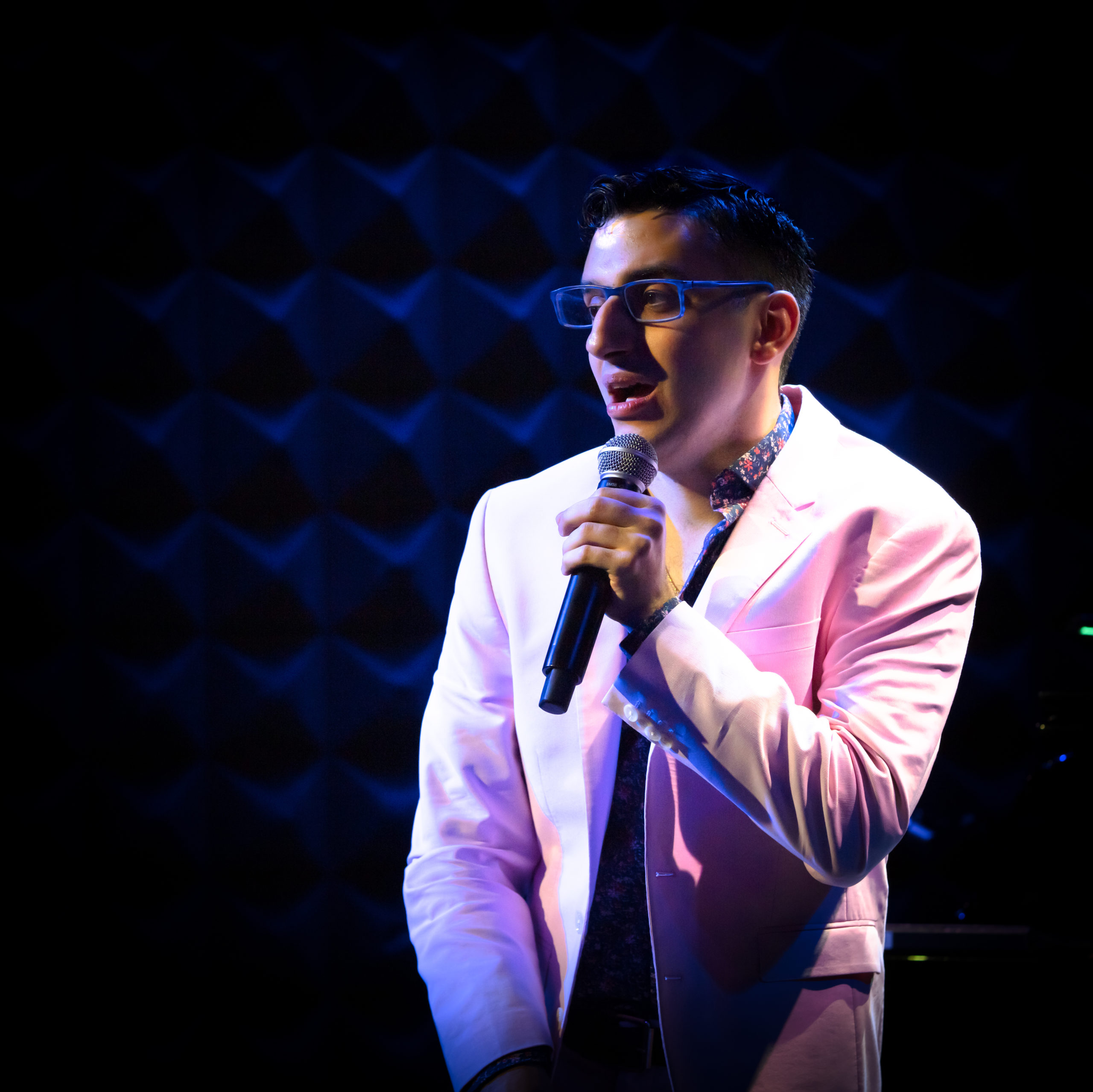Ryan J. Haddad leaned on his walker as his pompous and blunt fairy godmother (Danny Scheie) pranced on stage and commanded him, “Tell your own stories, and people will eat that shit up!” That’s exactly what Haddad did on Friday night at Bing Studio in his musical monologue, “Falling for Make Believe,” hosted by Stanford Live.
With humor, melancholy and lots of heart, Haddad recounted his personal journey of writing, acting and directing his own shows as a child with the support of his family. While Haddad wrote a beautiful ode to his family, he also confidently put himself — his desires, personality and ego — in the spotlight.
Blending the voices of his five-year-old and present-day selves, Haddad used sharp and self-deprecating humor to navigate his identity and those of his family members. While he jocularly depicted himself as a self-serious theater kid commanding his family to be in his plays, Haddad also showed how his family’s support helped him realize the dream of acting on stage, despite it seeming impossible for a man with cerebral palsy.
The autobiographical show began with Haddad at just five years old, when he founded the Haddad Theater acting troupe by casting his family members in “Cinderella.” Haddad played the prince and his “lesbian aunt Janice” played Cinderella, he said, adding that he retroactively reprimands his five-year-old self for not realizing the possibility of gender-bending.
Haddad expertly balanced humor with deeply moving moments. He borrowed from Broadway show tunes — “Falling in Love with Love,” “Tomorrow” and “A Way Back to Then,” to name a few — to intersperse storytelling with moments of lightness, touches of melancholy and wistful hope.
When Haddad was eight years old, his mother sent him to community theater to learn about acting with other kids. The acting teacher, ignorant of the implications of having cerebral palsy, told Haddad that he needed to act without his walker or he would never be cast in a play. In the middle of this heavy story, Haddad was suddenly and pompously interrupted by his fairy godmother. Singing a rendition of “It’s Impossible” from Rodgers and Hammerstein’s “Cinderella,” the fairy godmother became a comical caricature of the acting teacher’s cold practicality. So Haddad rejected the fairy godmother’s (and his acting teacher’s) version of reality; with minor tweaks in the lyrics, the song then became “It’s Possible,” exuberantly emanating hope from the stage.
The Haddad Theater featured a cast of strong personalities. Great Aunt Joan, to whom Haddad dedicated “Falling for Make Believe,” is the star of the show, the demanding diva — or, in her own words, “the bitch” — that no one can look away from. She came to a five-year-old’s play with her lines printed when no one else had any idea what they were saying. She pretended to get mad at Haddad for casting her as the maid instead of the second wife in his production of “The Parent Trap.” She pushed Haddad to join the community theater at age 13 to share his talents with a larger community. She told Haddad to put her in the back of his shows when he became a famous actor. Through the trope of the diva, Haddad showed Aunt Joan’s intense devotion to helping him realize his visions with loving humor that made her even more endearing.
Though Haddad possessed a bright-star quality, the night still felt like his intimate conversation with the audience. When Haddad first walked on and stood under the spotlight, he immediately had stage presence — his voice dominated the room when he sang. His performance, however, didn’t ask for aesthetic distance. Haddad was deeply connected with the audience — he trusted them to handle the humor, the sadness and the pain. When he took a break for water or took time to figure out his blocking, Haddad demonstrated faith in the audience’s patience and attention. His relaxed interactions with his pianist, Matthew Dean Marsh, revealed the love that they have for each other and brought the audience into their friendship.
At the center of “Falling for Make Believe” was Haddad’s love and appreciation for his younger self who dreamed the impossible and shot for the stars. The show beautifully honored the family that helped him find hope and laughter through the difficult parts of life and the Broadway musicals that gave him a means of expression. Haddad’s performance reminds us that none of us is alone — a reminder which comes with the promise of companionship but also the responsibility of love.
Editor’s Note: This article is a review and includes subjective opinions, thoughts and critiques.
